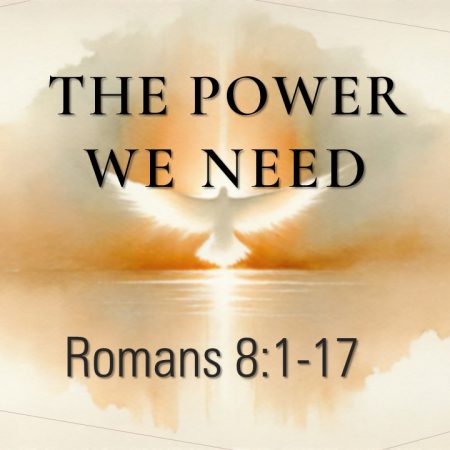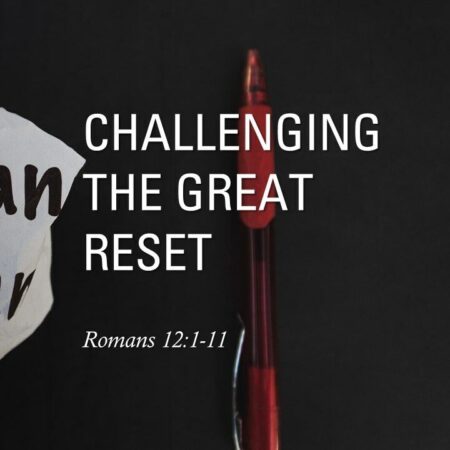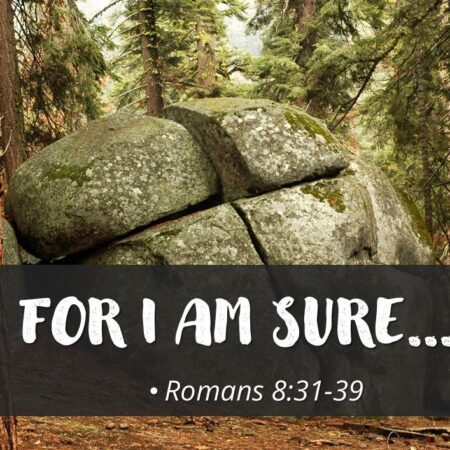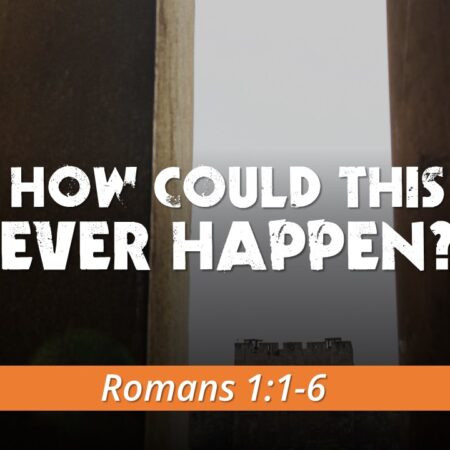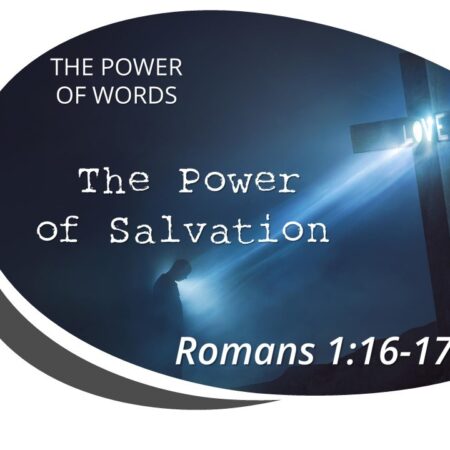Romans 8:1-17 John 14:18-19 Ephesians 2:6-10 Acts 1:3-5 1 Corinthians 15:3-8 John 20:19-22 John 1:1-3 2 Corinthians 5:17 John 3:31-34 John 7:37-39 John 1:29-32
Sermons on Romans
Acts 18:1-2 Romans 9:1-33 Gen 17:20-21 Genesis 25:21-23 2 Peter 3:9 Matthew 23:37 Exodus 3:19 Exodus 7:1-4 Exodus 7:13 Exodus 7:22 Exodus 8:15 Exodus 8:19 Exodus 8:32 Exodus 9:7 Exodus…
Romans 13:1-7 Acts 5:17-42 Jeremiah 15:18-23 John 11:38-44
Psalm 89:14 Romans 5:12-21 Genesis 3:17-19 Psalm139:13-14 James 1:17-18 Genesis 3:22 Ezekiel 18:19-23, 30-32 Ezekiel 33:11 Genesis 8:21 Genesis 4:6-7 Romans 5:17
Romans 12:1-11 Matthew 22:34-40 Romans 12:2 2 Corithians 10:4-5 Romans 8:31-39 “Ideology is a system of ideas and ideals, especially one which forms the basis of economic or political theory…
Ryan Holiday is the author of a book titled: “The Obstacle Is The Way”
“There is an old Zen story about a king whose people had grown soft and entitled. Dissatisfaction with this state of affairs, he hoped to teach them a lesson. His plan was simple; He would place a large boulder in the middle of the main road, completely blocking entry into the city. He would then hide nearby and observe their reactions.
How would they respond? Would they band together to remove it? Or would they get discouraged, quit, and return home?
With growing disappointment, the king watched as subject after subject came to this impediment and turned away. Or, at best, tried halfheartedly before giving up. Many openly complained or cursed the king or bemoaned the inconvenience, but none managed to do anything about it.
After several days, a lone peasant came along on his way into town. He did not turn away. Instead he strained and strained, trying to push it out of the way. Then an idea came to him; He scrambled into the nearby woods to find something he could use for leverage. Finally, he returned with a large branch he had crafted into a lever and deployed it to dislodge the massive rock from the road.
Beneath the rock were a purse of gold coins and a note from the king, which said:
“The Obstacle in the path becomes the path. Never forget, within every obstacle is an opportunity to improve our condition.”
As Susan Perlman in an article she wrote for “Jews for Jesus” publication said:
“One might ask, “What do we need pain for? Couldn’t we accomplish the same things with pleasure?”
The answer has to be that in pleasure we focus on ourselves and our feelings and our perceptions, which makes us to be mindful of ourselves and our will to be pleased; whereas pain helps us to focus outside of ourselves, to reach beside ourselves, to find out what’s there. Pleasure tends to make one self-centered, whereas pain tends to make a more noble person, other-centered and, hopefully God-centered.
A crisis becomes an occasion for declension or advance. A self-centered person in a crisis can become more self-centered and wallow in self-pity. God-centered or God-seeking persons can be propelled forward in their quest for meaning.
It is important to know that we are not helpless and we are not hopeless. We can choose to decide how we will deal with pain. We cannot choose whether or not we will have pain, but we can decide whether or not we will ALLOW PROBLEMS TO AFFECT US.
To live is to endure the pressures of life. But we can decide if we are going to let these things press us down or if we are going to let them lift us up.”
David Aikman wrote a book titled” GREAT SOULS” and in it he writes:
“I have always personally been inspired by the lives of great people. It is hard not to be energized by the stories of how individuals have risen above adversity or suffering or have maintained a purity in the face of great temptation. Our age, with its habit of instantly judging a man or woman’s life based on the fragmentary and proverbial sound bite, is often impatient with detail, nuances, depth.”
Chuck Swindoll writes about Joseph:
“Here is one on the list of God’s “greats”…….a life lived for His glory and, equally significant, though he was terribly mistreated, lived high above the all-too-common reactions of rage, resentment, and revenge. Here is one who deliberately chose to overlook unfair offenses, to overcome enormous obstacles, and model a virtue that is fast becoming lost in our hostile age – forgiveness.”
At the outset, Joseph’s life showed little promise – a simple shepherd, twelfth of thirteen children, a dreamer hated by his brothers. So how did he become a man so extraordinary that Moses spent almost fourteen chapters in the Book of Genesis telling his story? Where did Joseph get the qualities of integrity, leadership, and godliness in such measure that they took him from the pit of slavery to prime minister of Egypt?”
Through Joseph
• God explained dreams
• Revealed the future
• Saved Egypt and Israel from starvation
• Demonstrates the depth of love God has for all of us.
Paul is right:
For I am sure that neither death nor life, nor angels nor rulers, nor things present nor things to come, nor powers, not height not depth, nor anything else in all creation, will be able to separate us from the love of God in Christ Jesus our Lord.
About 40 years ago, Francis Schaeffer and C. Everett Koop, the former surgeon general of the Unites States, gave a lecture in which Francis Schaeffer made an astounding prediction. Ravi Zacharias attended this lecture and recalls it in his book titled WHY JESUS?
“At that talk, Schaeffer made a comment that caught me by surprise.
He said that the day was coming in the West when the name of Jesus
would not be recognized by the average young person; and if it were recognized, not a single historical fact about him would be known.
At that time I found this statement a bit hard to swallow and wondered
if he had said it just to be provocative. But a generation later, it is appearing to be quite true.”
Let me quote one more time Ravi Zacharias here:
“When you look back in the Old Testament, you see that in spite of all the instruction about worship, often repeated, and astounding loss nevertheless had occurred. All that the priests could control, they did. All that the ceremonies could control, they used to their advantage. And when a select or elect few control and sell salvation, the victim is always the common person. No religion is spared here.
One would think that this New Spirituality has brought about a new Eden and that its river flow peacefully and calmly. But it is not so…In fact, it has never been so. Few arenas lend themselves to abuse and loss as that of religion.”
Ravi Zacharias writes:
“It has been the beautiful teaching of the Word of God across time that has given this nation its ethos. It was this Word of God that put a song into the hearts of slaves during their darkest days. It was this Word of God that gave William Wilberforce in England the conviction and the courage to speak out against slavery and sustained him in the long struggle to see it abolished in the British Commonwealth. It was this Word of God that inspired Martin Luther King Jr. in his pursuit of civil liberty…And the same Word of God has transformed the life of many a prisoner, and of many others I could tell of, from some of the darkest parts of the world where the light of God’s Word has shone. Any nation that neglects teaching the sacredness of life and the family does so at its own peril. Any nation that sanctions the removal of God’s boundaries will destroy its own.”
Ravi Zacharias’ commentary on John 18 says:
“If there is any passage of Scripture that accurately describes our modern-day contempt for truth, our attachment to power, and our voluntary surrender to culture, it is this. It is not accidental that religious authorities, political appointees, and cultural symbols have come together to crucify him once again in our day. Barabbas was released…a cultural practice was fulfilled. “We have a law” … Political correctness was enjoyed. “he claims to be the Son of God…kill him” …all at the behest and with the blessing of religion. The irony is that he wanted to be owned by none of the three: culture, politics, or religion.”
The Meaning of the Word Salvation:
The Greek word is “soteria” meaning to provide recovery, to rescue, to effect one’s welfare.
The Hebrew root word is “yesha” (the basis for the name Joshua and Jesus) signifies freedom from what binds or restricts and thus effects deliverance.
Salvation for many Christians has to do with something that happened to them in the past, or something they hope happened in the past.
For those people salvation has primarily to do with getting OUT OF HELL and getting in to HEAVEN.
I have no idea where this originally came from, but what I do know is that no matter how intense we search the entire Bible, NOT ONCE ARE WE BEING TOLD THAT WE ARE SAVED FROM HELL. It’s just not there.
What the Bible does say is THAT WE ARE SAVED FROM SIN. And Sin in its essence is A BROKEN RELATIONSHIP WITH GOD. Sin separated us from having a relationship with God.
Salvation is the gracious work of God whereby He delivers undeserving, gospel-believing sinners from sin and its results; brings them into a right, vital relationship with Himself; and bestows on them the riches of His grace.
Dallas Willard in his book: LIVING IN CHRIST’S PRESENCE says:
“It’s not by accident that he (Jesus) says this, because that oneness, that community, is God’s signature. He doesn’t say, “May they be given ability to out-argue all their foes.” He doesn’t say, “May they be given the power to change the culture.” He doesn’t say, “May they be given really cool worship services.” Trinitarian fellowship is the foundation of the existence of that which is real.”
But eternal life is not AN EVENT. SALVATION IS NOT AN EVENT. SALVATION IS A PERSON. There is only ONE SAVIOR.
Romans 1:18-25 Acts 17:26-27 Deuteronomy 5:6-10 2 Corinthians 4:4 1 Kings 16:33 1 Kings 18 Isaiah 11:1-9
Philip Yancey ins his book “DISAPPOINTMENT WITH GOD writes:
I found that for many people there is a large gap between what they expect from their Christian faith and what they actually experience. From a steady diet of books, sermons, and personal testimonies, all promising triumph and success, they learn to expect dramatic evidence of God working in their lives. If they do not see such evidence, they feel disappointment, betrayal and often guilt.” Philip Yancey
C.S. Lewis nails it when he writes in Mere Christianity:
“Either we give up trying to be good, or else we become very unhappy indeed. For, make no mistake: If you are really going to try to meet all the demands made on the natural self, it will not have enough left over to live on. The more you obey your conscience, the more your conscience will demand of you. And your natural self, which is thus being starved and hampered and worried at every turn, will get angrier. In the end, you will either give up trying to be good, or else become one of those people who, as they say, “live for others” but always in a discontented, grumbling way – always making a martyr of yourself. And once you have become that you will be a far greater pest to anyone who has to live with you than you would have been if you had remained frankly selfish.”
Ralph Waldo Emerson said:
“The God of the cannibals will be a cannibal, of the crusaders a crusader, and of the merchant, a merchant.”

